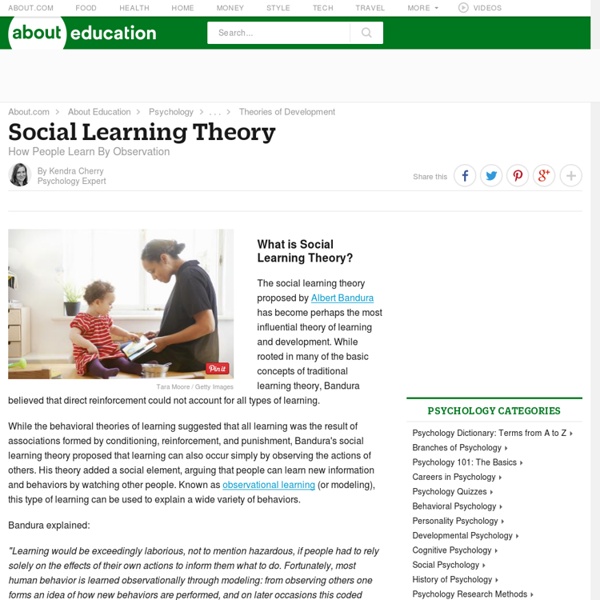Social Learning Theory: Understanding Bandura's Theory of Learning

Étude : le e-learning ne convient pas à tous
Apprendre sans désir, c’est désapprendre à désirer. (Raoul Vaneigem) Une étude (PDF; p. 31) conclut que les cours en ligne ne profitent pas à tous les apprenants (University of Missouri : Despite Popularity, MU Researcher Finds not Everyone Can Successfully Learn Through Online Courses). Avec seulement 30 % environ des étudiants qui terminent les cours, il y a effectivement de quoi s’interroger. L’auteur fait cependant l’intéressante observation que les étudiants qui s’accommodent bien des cours en ligne présentent les mêmes caractéristiques que ceux qui réussissent dans un cadre traditionnel. L’éducation traditionnelle ne convient pas plus à tous, quoique le taux de décrochage n’atteint pas 70 %. Le e-learning n’est encore qu’au stade embryonnaire, contrairement à l’éducation traditionnelle. Peu importe la méthode, la pédagogie et le moyen doivent s’imbriquer à l’individu. (Image thématique : Learning Curves, par James Rosenquist) Par ricochet : Les types de e-learning Enseigner au futur
The differences between learning in an e-business and learning in a social business
In my recent webinar, Social & Collaborative Learning in the Workplace, I shared a slide that showed the 5 stages of workplace learning. This has attracted a lot of interest, and I’ve been asked to talk more about the differences between “learning” in Stages 1-4 and Stage 5. Working and learning in Stages 1-4 is based upon a Taylorist, industrial age mindset. Although the advent of e-technology in the late 1990s changed businesses into e-businesses, this was essentially about automating existing business thinking and practices. Stage 5, however, is quite different. Now, let’s be clear about what a social business is. “A Social Business isn’t just a company that has a Facebook page and a Twitter account. In the chart below I’ve briefly summarised some of the fundamental differences in thinking and practice between “learning in an e-business” and “learning in a social business” – and how it can be supported.
Related:
Related:



